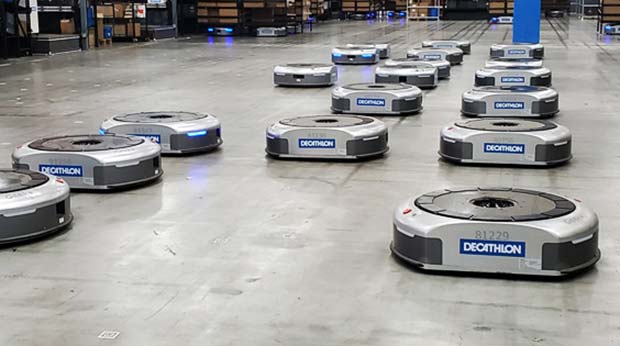Today, the rise of e-commerce and an increase in B2C deliveries are putting a strain on the world of retail. As expectations for fast and accurate deliveries and ever-changing buying habits adds complexity to a sector already hampered by labor shortages, more and more retailers have started to consider the advantages of automation. Whilst manufacturing has relied on robotics and automation for decades, logistics – up until now – has remained reliant on a human workforce. This is all likely to change.
 Currently, there are close to 100,000 distribution and fulfillment centers around the world, and less than 5% of those are fully automated. Amazon aside, Goods-to-Person robotics solutions have only been implemented in a few hundred warehouses so far. With e-commerce sales expected to grow from $1.9Tr US in 2019 to $3.2Tr US dollars in 2024 according to Interact Analysis, companies may do well to consider what they can do to stay ahead.
Currently, there are close to 100,000 distribution and fulfillment centers around the world, and less than 5% of those are fully automated. Amazon aside, Goods-to-Person robotics solutions have only been implemented in a few hundred warehouses so far. With e-commerce sales expected to grow from $1.9Tr US in 2019 to $3.2Tr US dollars in 2024 according to Interact Analysis, companies may do well to consider what they can do to stay ahead.
Two years ago, Decathlon – a globally leading sports retailer, faced many challenges known to global retailers today. If it initially was the possibility to mitigate labor shortages, that made the global retailer consider automation, it was the capabilities provided by Geek+ – a global AMR leader, to flexibly scale operations, that made Decathlon choose Geek+ as its long-term automation partner.
In 2018, they saw the first deployment of a robotics system in one of Decathlon’s e-commerce facilities in Shanghai in less than one month, the retailer had set up a 700 sqm project, deploying 15 Geek+ robots and two workstations. After two months, Decathlon had gathered the experience and data needed to decide to expand the cooperation. Today, Geek+ AMRs runs the operations in seven of Decathlon’s e-commerce and retail warehouses in China.
By empowering the retailer with new capabilities and efficiencies, the retailer now boasts a 40% increase in storage capacity due to the ability of robots to stack robot-compatible shelving racks very densely.
Additionally, the cooperation has led to a threefold rise in the average productivity of labor as the goods-to-person solution reduces the walking time of employees. If adopting automated systems initially led to a reduced workforce, Decathlon was soon able to redeploy large parts of the workforce, as intelligent robots provided them with capabilities to quickly expand operations and grow. By providing Decathlon with flexibility, the global retailer has been able to handle peak and fluctuating demand-cycles, allowing them to secure a three-year ROI.
In 2020, the cooperation between Geek+ and Decathlon received recognition from industry experts in regard to Covid-19, as Geek+ solutions enabled Decathlon to, despite widespread labor shortages and strict lockdown rules, secure business continuity, and through the remote support of Geek+, push a Goods-to-Person roll-out in only two weeks. Decathlon was also able to flexibly relocate robots from retail to e-commerce warehouses to meet the swift shift in demand from offline to online under the lockdown period in China.
In a world where uncertainty is the only thing certain, Geek+ systems will empower companies with flexible solutions to grow and build resilience to unexpected events and fluctuating demand. The journey of Geek+ and Decathlon is, more than anything, a testament to the flexibility and ability to build anti-fragility capabilities with intelligent robotics solutions.




Comments are closed.